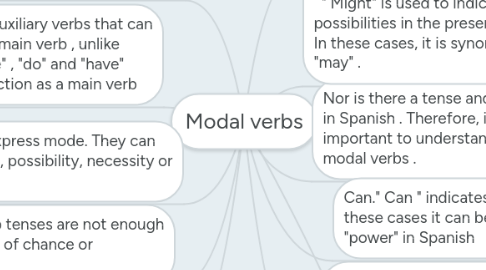Modal verbs
by Leannys leon

1. Modal verbs are auxiliary verbs that can not function as a main verb , unlike auxiliary verbs "be" , "do" and "have" that they can function as a main verb
2. Modal verbs express mode. They can express ability , possibility, necessity or other status.
3. The English verb tenses are not enough to express ideas of chance or uncertainty .
4. Could . "Could " indicates possibility or ability in the past.
5. May. As "could " , "may" is used to indicate possibilities in the future
6. must "Must" indicates an obligation, prohibition or need. You can also use "have to" ( having to
7. Nor is there a tense and the subjunctive in Spanish . Therefore, it is very important to understand the uses of modal verbs .
8. Can." Can " indicates skill or ability . In these cases it can be translated as "power" in Spanish
9. Might. " Might" is used to indicate possibilities in the present or the future. In these cases, it is synonymous with "may" .
10. Should . "Should " indicates an obligation or recommendation. It reflects an opinion on what is right . It translates as the conditional "should" in Spanish .
11. Would ."Would" is used to declare a preference and to ask for something politely.


